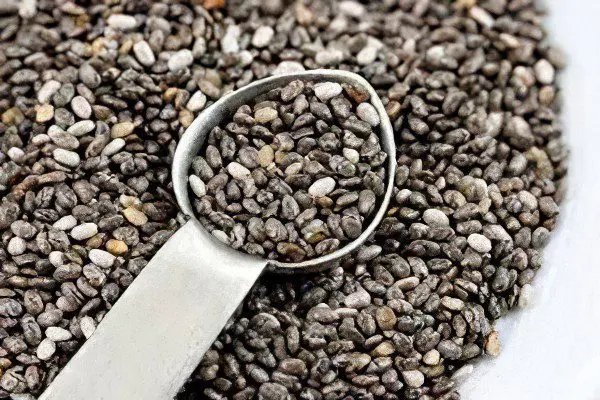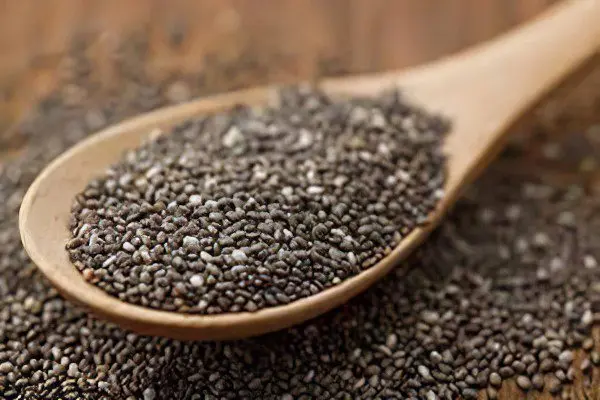
Chia seeds are the tiny black seeds of the Salvia hispanica plant.
South America can rightly be called the birthplace of chia seeds, where the ancient Mayan tribes actively used them as one of the staple foods present in the daily diet. In fact, “chia” is an ancient Mayan word for “strength”.
Today, they are grown on plantations around the world, but the seeds that are harvested on the mountain plateaus are most in demand.
Despite their ancient history as a staple food, chia seeds have only recently become recognized as a modern superfood. In the past few years, their popularity has increased and they are now used by health conscious people all over the world.
Benefits of chia seeds

Not so long ago, chia seeds were introduced to domestic consumers, who were immediately noted for their unsurpassed properties. They are an ideal source of energy for people, and with regular use, they will energize and cheer up. Seeds have a unique ability to dull even a strong feeling of hunger, so they are simply indispensable for people who are constantly fighting extra pounds.
Composition and calorie content
Calories 486 KKal
- Fats:
30,7 g
- Proteins:
16,5 g
- Carbohydrates:
42,1 g
- Water:
5,8 g
- Ash:
4,8 g
- Cellulose:
34,4 g
Vitamins | Quantity | % RDN |
Vitamin B3 (PP, nicotinic acid) | 8,8 mg | 55% |
Vitamin B1 (thiamine) | 0,6 mg | 51% |
Vitamin B2 (riboflavin) | 0,2 mg | 13% |
Vitamin B9 (folic acid) | 49,0 mcg | 12% |
Vitamin E (alpha tocopherol) | 0,5 mg | 3,4% |
Minerals (in 100 g): | Quantity | %RDN |
Phosphorus | 860 mg | 123% |
Manganese | 2,7 mg | 118% |
Copper | 0,9 mg | 103% |
Selenium | 55,2 mcg | 100% |
Magnesium | 335 mg | 84% |
Hardware | 7,7 mg | 77% |
Calcium | 631 mg | 63% |
Zinc | 4,6 mcg | 42% |
potassium | 407 mg | 9% |
10 health benefits of chia seeds
Here are 10 scientifically proven benefits of chia seeds:
High content of antioxidants. Another advantage of chia seeds is the high amount of antioxidants that protect the fats in the seeds from rancidity. Although the benefits of antioxidant supplements are still being debated, researchers agree that getting antioxidants from foods is much healthier. The main task of antioxidants is to fight free radicals that damage cellular molecules that contribute to early aging and the acquisition of diseases, such as cancer. [2], [3]
Lots of fiber, few carbs. Chia seeds are 40% fiber, making them one of the best sources of fiber in the world. Two tablespoons (30 grams) of chia seeds contain 11 grams of fiber. The content of digestible carbohydrates is only 1 gram per 2 tablespoons, which is very small. This makes chia a low carb food.
Theoretically, this should increase satiety, slow down digestion, and reduce calorie intake.
Fiber also feeds the good bacteria in your gut, which is essential for a healthy gut flora. [5]
Chia seeds contain complete protein. Chia contains a large amount of protein, about 14% by weight of seeds, which is a high figure. They also have a balanced set of essential amino acids that the absorption of protein by our body. Protein has various health benefits and is the most beneficial for weight loss. [6].
The high fiber and protein content of chia seeds can help you lose weight. Soluble fiber absorbs large amounts of water and expands in the stomach, which should increase satiety and slow food absorption. Several studies have looked at the soluble fiber glucomannan, which works in a similar way, showing that it can lead to weight loss. In addition, the protein in chia seeds can help reduce appetite and food intake. [8]
In fact, one study found that eating chia seeds for breakfast increased satiety and reduced food intake. [9]
However, studies on the effectiveness of chia seeds for weight loss have yielded rather disappointing results.
In a study of 90 overweight people, 50g of chia seeds per day for 12 weeks had no effect on body weight or health outcomes. [10]
In another 10-week study in 62 women, chia seeds had no effect on body weight, but increased blood levels of omega-3s. [11].
In contrast, a 6-month study of obese people with type 2 diabetes on a low-calorie diet found that daily consumption of chia seeds led to significant weight loss than placebo. [12]
For healthy weight loss, it is not enough to add or subtract a certain product from the diet. Here it is important – a change in lifestyle, sleep and exercise. Combined with this, chia seeds can definitely help you lose weight.
Chia seeds are rich in omega-3 fatty acids. However, it is important to remember that omega-3s are primarily alpha-linolenic acid (ALA), which is not as beneficial. ALA must be converted to the active forms of eicosapentaenoic acid (EPA) and docosahexaenoic acid (DHA) before they can be absorbed by the body. Unfortunately, the human body has a hard time processing ALA into these active forms. [13].
Studies have shown that chia seeds, especially if crushed, can increase blood levels of ALA and EPA, but not DHA. Because they don’t supply DHA, which is the most important omega-3 fat, most experts consider chia to be a poor quality omega-3 source. [14]
Reduce the risk of cardiovascular disease. Given that the seeds are rich in fiber, protein, and omega-3s, they may reduce the risk of heart disease. Their benefits have been examined in several studies, but the results have been inconclusive.
Rat studies have shown that chia seeds can reduce certain risk factors, including triglycerides, inflammation, insulin resistance, and belly fat. They can also increase “good” HDL cholesterol. [15]
Several studies show that chia seeds significantly lower blood pressure in people with hypertension, which is a strong risk factor for cardiovascular disease. (16)
Strengthen bones. Chia seeds are rich in calcium, magnesium, phosphorus and protein. The calcium content is particularly impressive – 18% of the RDA (recommended daily intake) in two tablespoons (30 grams). This is higher than most dairy products.
But keep in mind that the seeds also contain phytic acid, which to some extent reduces the absorption of calcium. Therefore, soak them in water before use.
Reduce blood sugar levels. High fasting blood sugar is a typical symptom of type 2 diabetes. Persistently high fasting blood sugar is associated with an increased risk of several chronic diseases, including heart disease. [17]
But temporary spikes in blood sugar levels after a meal can also have adverse health effects if they are excessively high and occur on a regular basis. [18]
Animal studies have shown that chia improves insulin sensitivity and blood sugar control by stabilizing post-meal levels. [19]
Several human studies support this, showing that eating bread containing chia seeds reduces the rise in blood sugar compared to bread without chia. [20]
Reduce chronic inflammation. Inflammation is our body’s normal response to infection or injury. While inflammation helps the body heal and fight off bacteria, viruses, and other infectious agents, it can sometimes be harmful. This mainly refers to chronic inflammation, which is associated with an increased risk of cardiovascular disease and cancer.
Chronic inflammation often has no visible signs, but it can be assessed by measuring inflammatory markers in the blood. Various unhealthy habits increase the risk of chronic inflammation, including smoking, lack of exercise, or an unhealthy diet.
On the other hand, certain healthy foods can lower blood levels of inflammatory markers.
One three-month study in 20 people with diabetes showed that eating 37 grams of chia seeds daily reduced the inflammatory marker hs-CRP by 40%. In contrast, those who received wheat bran did not receive this benefit. [21]
However, these health benefits are not yet precisely determined, and more research is needed.
Chia seeds are easy to include in your diet. The seeds themselves do not have much taste, so they can be added to almost anything. They also don’t need to be ground like flax seeds, making them much easier to prepare.
They can be eaten raw, soaked in juice, added to cereals, puddings, smoothies, or added to baked goods.
Recipe:
Add 1/4 cup (40 grams) of chia seeds to 4 cups (1 liter) of fruit juice and soak for 30 minutes for a drink full of fiber and minerals.
You can also add them to cereals, yogurt, vegetables or rice dishes.
Because of their ability to absorb both water and fat, they can be used to thicken sauces.
They are also well tolerated, but if too many seeds are eaten at one time, there is a possibility of digestive side effects.
[Video] Dr. Berg on the benefits of chia seeds:









